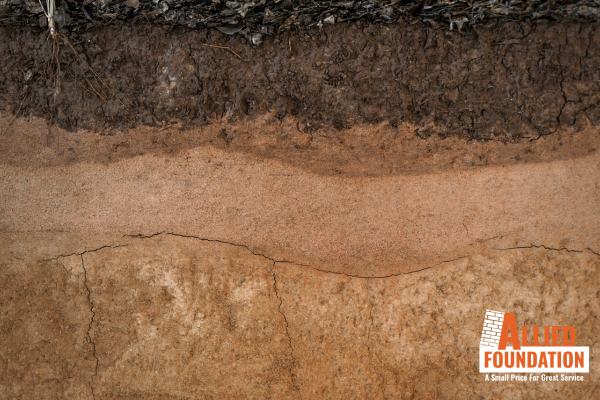As a Houston homeowner, you may have heard about the city’s unique soil conditions and their impact on home foundations. But what exactly makes Houston’s soil problematic, and why does it lead to foundation issues? In this blog, we’ll explore the composition of Houston’s soil, the science behind its behavior, and what homeowners can do to mitigate these foundation problems.
The Composition of Houston’s Soil
Houston’s soil is predominantly composed of expansive clay, known locally as “Houston Black” or “Gumbo.” This soil type is characterized by its high clay content, which can absorb significant amounts of water. While this might seem harmless, it’s the swelling and shrinking behavior of this clay that poses a threat to home foundations.
Expansive Clay and Its Characteristics
Expansive clay soils contain minerals such as montmorillonite, which have the ability to absorb water. When it rains, these minerals can cause the soil to swell. Conversely, during dry spells, the soil loses moisture and contracts. This constant cycle of expansion and contraction exerts tremendous pressure on home foundations, leading to cracks and other structural issues.
The Science Behind Soil Movement in Houston
Understanding why expansive clay causes foundation problems requires a look at the science of soil mechanics.
Swelling Pressure
When expansive clay absorbs water, it increases in volume. This process, known as swelling, creates upward pressure on a home’s foundation. This pressure can lift the foundation unevenly, leading to cracks in the walls, floors, and ceilings. Over time, these small cracks can become significant structural issues if not addressed.
Shrinkage and Settlement
During periods of drought or extended dry spells, the moisture content in the clay decreases, causing the soil to shrink. As the soil contracts, it can create voids and gaps beneath the foundation. This shrinkage can lead to foundation settlement, where parts of the home sink unevenly. This differential settlement can cause significant structural damage, including misaligned doors and windows, cracked bricks, and uneven floors.
Houston’s Climate and Its Impact
Houston’s climate exacerbates the problems associated with expansive clay. The city experiences heavy rainfall during certain seasons and long dry spells during others. This erratic weather pattern causes the soil to undergo repeated cycles of swelling and shrinking, putting continuous stress on home foundations.
Rainfall and Moisture Variation
Houston’s average annual rainfall is about 50 inches, with most of it occurring during the spring and fall months. These heavy rains cause the soil to absorb water quickly, leading to swelling. However, Houston also experiences hot, dry summers, which can cause the soil to dry out and shrink. This constant fluctuation in moisture levels is a primary factor in foundation problems.
Signs of Foundation Problems
As a homeowner, it’s crucial to recognize the signs of foundation problems early. Identifying issues early can save you time and money on repairs. Here are some common signs to look out for:
Cracks in Walls and Floors
One of the most obvious signs of foundation problems is the appearance of cracks in the walls, floors, and ceilings. These cracks can be vertical, horizontal, or diagonal and often indicate that the foundation is shifting or settling unevenly.
Sticking Doors and Windows
If your doors and windows are suddenly difficult to open or close, it could be a sign of foundation movement. As the foundation shifts, it can cause the frames of doors and windows to become misaligned.
Uneven Floors
If you notice that your floors are no longer level, it’s a strong indication of foundation issues. Uneven floors can be caused by differential settlement, where one part of the foundation sinks more than another.
Gaps Around Windows and Doors
Gaps around windows and doors can also indicate foundation problems. As the foundation moves, it can cause the frames to separate from the walls, creating gaps that allow air and moisture to enter your home.
Mitigating Foundation Problems
While Houston’s soil conditions can be challenging, there are steps homeowners can take to mitigate foundation problems. Here are some strategies to consider:
Proper Drainage
Ensuring proper drainage around your home is crucial in managing the moisture levels in the soil. Installing gutters and downspouts to direct water away from the foundation can help prevent excessive swelling of the soil. Additionally, grading the landscape to slope away from the house can prevent water from pooling near the foundation.
Moisture Control
Maintaining consistent moisture levels in the soil can help reduce the risk of foundation problems. During dry periods, consider using soaker hoses or an irrigation system to keep the soil around your foundation evenly moist. This can help prevent the soil from shrinking and creating voids under the foundation.
Foundation Inspections
Regular foundation inspections by aprofessional can help identify potential issues before they become severe. An experienced inspector can assess the condition of your foundation and recommend preventive measures or repairs if needed.
Soil Stabilization
In some cases, soil stabilization techniques can be used to improve the soil’s ability to support a foundation. This might involve injecting stabilizing materials into the soil or using chemical treatments to reduce its expansive properties.
Professional Foundation Repair
If you suspect or identify foundation problems, it’s essential to consult with a professional foundation repair company. These experts can assess the extent of the damage and recommend the most appropriate repair methods. Common foundation repair techniques include:
Pier and Beam Systems
Pier and beam systems involve driving steel piers into the stable soil beneath the foundation to support and stabilize it. This method can lift and level a sinking foundation, preventing further damage.
Underpinning
Underpinning involves extending the foundation’s depth or adding support to it by installing additional piers or pilings. This method provides extra stability to the foundation and can prevent further settlement.
Houston’s Soil Can Be a Challenge To Homeowners
Houston’s unique soil conditions present a significant challenge for homeowners. The expansive clay soil, combined with the city’s erratic climate, can lead to foundation problems that compromise the structural integrity of homes. By understanding the composition of Houston’s soil and the science behind its behavior, homeowners can take proactive steps to mitigate foundation issues. Proper drainage, moisture control, regular inspections, and professional repairs are all essential strategies for protecting your home from the effects of Houston’s soil. If you suspect foundation problems, don’t hesitate to seek the advice and services of a professional foundation repair company, like Allied Foundation to ensure the long-term stability and safety of your home.



